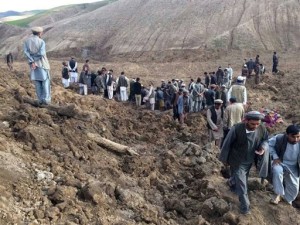KABUL, Afghanistan — A landslide triggered by heavy rain buried about a third of a remote northeastern Afghan village on Friday, killing at least 350 people and leaving more than 2,000 missing. Villagers looked on helplessly and the governor appealed for shovels and other equipment to help dig through the mass of mud that flattened the homes in its path.
The mountainous area in Badakhshan province has experienced frequent floods in recent days, and the side of the hill collapsed onto the village of Hobo Barik at about 1 p.m. Landslides and avalanches are frequent in Afghanistan, but Friday’s was one of the deadliest.
Gov. Shah Waliullah Adeeb said more than 2,000 people were missing after a hill collapsed on the village of after days of heavy rain. Adeeb said the landslide buried some 300 homes in the area — about a third of all houses there.
Ari Gaitanis, a spokesman from the United Nations Assistance Mission in Afghanistan, said at least 350 people died in the landslide. He said the U.N. was working with authorities on the ground to rescue people still trapped.
The governor said rescue crews were working but didn’t have enough equipment.
“It’s physically impossible right now,” Adeeb said. “We don’t have enough shovels; we need more machinery.”
Video footage of the scene showed how a large section of the mountain had simply slipped away sending mud and earth sliding through the village below.
The landslide was likely due to heavy rain in the area, said Abdullah Homayun Dehqan, the province’s director for National Disaster Department. He said floods last week in different districts of the province killed four people and eight more were still missing.
The province normally has many landslides, but they generally occur in remote areas and produce no casualties, said Mohammad Usman Abu Zar from the Meteorology Department of Badakhshan province. He said authorities would investigate further, but initial reports indicated that the heavy rain was the cause.
Authorities evacuated a nearby village over concerns about further landslides, the governor said.
Provincial police chief Faziluddin Hayar said the landslide happened about 1 p.m. Friday. Friday is a day of worship in Afghanistan, so many families would have been at home instead of at work at the time.
Badakhshan province, nestled in the Hindu Kush and Pamir mountain ranges and bordering China, is one of the most remote in the country. The area has seen few attacks from insurgents following the 2001 U.S.-led invasion of Afghanistan.
Afghans living in the rugged mountains of northern Afghanistan are used to avalanches as well. The most deadly one in the past two years occurred in February 2010, when more than 170 people were killed at the 12,700-foot (3,800-meter) -high Salang Pass, which is the major route through the Hindu Kush mountains that connects the capital to the north.
AMIR SHAH, Associated Press
RAHIM FAIEZ, Associated Press
Associated Press writer Rebecca Santana contributed to this report.
Report compiled with information from The Associated Press.
 CGTN America
CGTN America Afghans search for survivors after a massive landslide landslide buried a village Friday, May 2, 2014 in Badakhshan province, northeastern Afghanistan, which Afghan and U.N. officials say left hundreds of dead and missing missing.(AP Photo/Ahmad Zubair)
Afghans search for survivors after a massive landslide landslide buried a village Friday, May 2, 2014 in Badakhshan province, northeastern Afghanistan, which Afghan and U.N. officials say left hundreds of dead and missing missing.(AP Photo/Ahmad Zubair)
